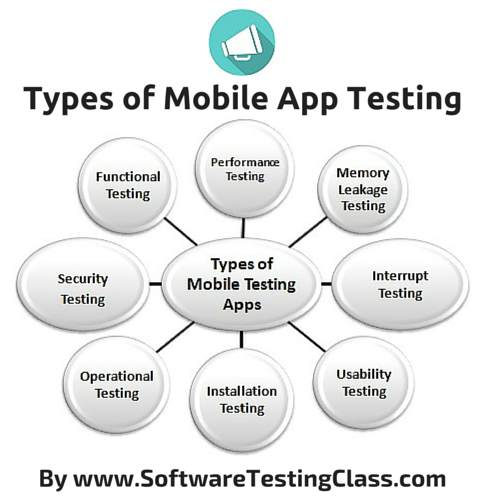In previous article on mobile testing tutorial series we have seen “Tutorial 3. Mobile Testing Challenges and Solutions“. As how life is becoming faster, technologies are also becoming wider, faster and enriched. In this fast growing life, everyone wants to adapt mobile phones. That can resolve the purpose of mobile and laptop both. Most of the mobile phones are enriched with advanced applications & features. That are much more capable in resolving all purpose of the users need. Those applications are tested by many different type of testing methodologies. Lets see Types of Mobile App Testing.
Types of Mobile App Testing:
Let’s see, which all testing process are involved in Mobile App Testing.
Functional Testing:
Functional testing performs on the functional behavior of the application. It will ensures that the application is working as per the requirements. Mostly, testing performs on the user interface and call flows of the application. As like other UI applications mobile applications also require lots of human consideration. If, functional testing performs on mobile devices manually, it is going to be extremely complex. Not only complex, but also exhaustive and time-consuming task due to various mobile-specific challenges like; various mobile devices, mobile operating systems, and functions & applications involve with mobile devices. Functional testing automation process also requires lots of human resources, money, and time. Testers are ready to automate the testing process by using many tools due to its strong market value & user demand. Teams can then combine automated tests with selected manual test scenarios to balance the coverage & efficiency of the functional testing. To test some functionalities of the application tester go for manual testing process. However later on tester combines manual testing and automation testing for better result.
Performance Testing:
The testing process is carried out by tester to test the performance and actions of the applications that pass through various mobile device challenges like; low battery power due to heavy battery uses, network out of coverage area/poor bandwidth/changing internet connection mode (2G, 3G, or WiFi)/changing broadband connection, transferring heavy file, less memory, concurrent approach to the application’s server by various users, etc. Application’s server and client both strongly affect the performance of the mobile application, so testers perform testing on both side of the application.
Memory Leakage Testing:
Memory leakage is one of the bad issues of the mobile application testing that directly affect on performance of the mobile devices. Due to memory leakage, process might slow down while transferring the file or in-between accessing any application mobile device might switch off automatically. Thus, Mobile devices come with limited memory as compare to computer system, and by default, most of the mobile OS stop applications those are using extreme memory for processing; memory leakage testing becomes essential to check the performance of the Mobile Applications Testing to ensure that each application of the mobile device is using optimized memory for processing.
Interrupt Testing:
Interrupt testing is a process of testing a mobile application that functions may get interrupted while using the application. Those interruptions can be; incoming and outgoing SMS/MMS/calls, incoming notifications, battery/cable insertion and removal for better uses, network outage and recovery, switch off/switch on of the media player and other connecting devices, Low memory warning, and device power cycle(like; low battery notification).
An application should be capable to hold these interruptions by going into a suspended state and restarting afterwards.
Usability testing:
Usability testing is used to test the mobile applications in terms of usability, flexibility, and friendliness. The testing process makes sure that the mobile app is now easy to use and offers a suitable user experience to the customers.
Installation testing:
Mobile devices hold two types of applications; the one which automatically comes with mobile OS (while installing OS, it automatically get installed), and another one you have to install specially from the store to use the particular application.
Installation testing is used to test the particular application is installing, uninstalling, and updating properly without any interruption (user is smoothly and flexibly installing the application).
Operational testing:
Any mobile OS and desktop OS provides in-built back-up and recovery operational functions that save or recover all files or doc of mobile devices or applications that had been lost due to some reason. Operational testing is used to test that the particular back-up and recovery process is working properly and responding as per the requirement.
Security Testing:
The purpose of security testing to test the application’s data and network security to check the application’s data and network security is responding as per the given requirement/guideline.
Conclusion
All above testing methodologies prove that users can trust on applications that come with mobile devices, all applications are completely tested with many testing methodologies. But, be careful before using applications on mobile devices, if mobile applications involve internet connection then make sure that the device is already carrying antivirus. If, you don’t have antivirus on your device then it won’t be a fault of the applications installed on the mobile device; it is just a fault on you mobile system.
In this article we learned about “Types of Mobile Application Testing“, if you worked on mobile app testing and have some tips to share, please do it in below comment section. Also ask questions on mobile app testing and we would be happy to hear and answer your queries.
⇓ Subscribe Us ⇓
If you are not regular reader of this website then highly recommends you to Sign up for our free email newsletter!! Sign up just providing your email address below:
Happy Testing!!!
- Tutorial 2: Introduction to Mobile Testing Application
- Mobile Testing Tutorial Series – Tutorial 1 Mobile Application Testing Strategy
- Mobile Testing Challenges and Solutions – Tutorial 3
- Learn How to Test Your Android Application?
- Top 5 Mobile Automation Tools to Test Android Applications
- Mobile Testing Tutorial 6: Beginning Guide Of iOS Testing
- How to test mobile readiness of any website?
- 6 Steps To Eradicate Mistakes Using Mobile Test Automation Strategy
- How to Make Mobile Testing and Agile Meet?
- How Appium enables Test Automation on Android & IOs Devices


18 thoughts on “Tutorial 4 – Types of Mobile App Testing”
Excellent article, Clear focus on mobile testing types and very good view of author.
Article is very informative and the types of mobile testing are good.
Looking for job in testing, can someone please help me to get the job. Salary is not the concern parameter.
Very useful for me, thanks and looking forward for similar great content.
This is simply awesome tutorial.
Very good post. Thanks
I am freshers in testing and thank you for Sharing this post. It would be more helpful for freshers like me. One Suggestion, if you able to share the videos on mobile testing then it would be like cherry on top of cream!!!
Thank you very much for sharing such a wonderful article. This is really a useful one for mobile testing.
Awesome content to read on mobile testing types.
Really nice article on types of mobile testing. Thank you.
Hi,
I am preparing interview on mobile application testing. Can someone pls suggest me how to prepare for interview?
very good post for fresher like us.
Really Great Article.Got Lot of Things.Thanks.
Nice Article… Great lesson for out professional life… Appreciated your article.
Hi Guys,
Just I`m join Mobile App Testing course needs some guide lines hope doing well.
nice article useful information for mobile testers
usefull information
Great article…
Can you please share Default / Sample Non functional test cases for App.
Thanks,
Jay